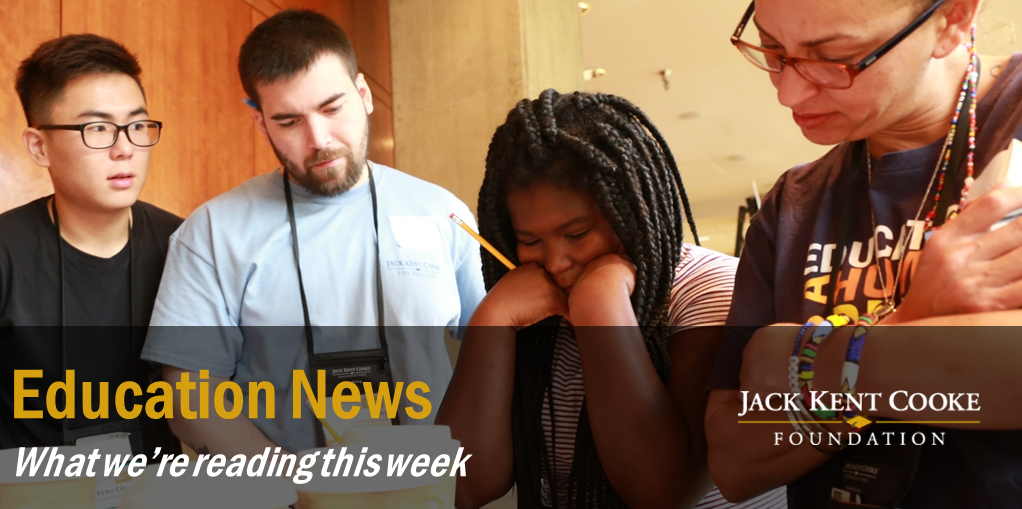Posted
October 30, 2015
|
By
Cooke Foundation Staff
 October 30, 2015—Our weekly roundup of the biggest news you might have missed! This week, the media focused on identifying and closing the Excellence Gap, expanding college access to underrepresented students, and the NAEP test scores drop.
October 30, 2015—Our weekly roundup of the biggest news you might have missed! This week, the media focused on identifying and closing the Excellence Gap, expanding college access to underrepresented students, and the NAEP test scores drop.
Elementary and Secondary Education:
- Sarah D. Sparks highlights issues of diversity in programs directed at high-achieving students from kindergarten through college in two separate pieces for Education Week:
- Brandon L. Wright and Chester E. Finn Jr. profile New York City in their call for universal gifted screening practices for The New York Post. The two also joined Executive Director Harold Levy and other education leaders for events this week in Washington, D.C., and New York.
- District Administration describes how some schools are re-examining disciplinary policies after determining that they disproportionately punish black students and disabled students and are connected with lower test scores and higher dropout rates.
- Studying educational improvement and opportunities in America’s cities, Brookings identifies several academic inequities, including that “students eligible for free and reduced-priced lunch and students of color in the cities were less likely than white students to enroll in high-scoring elementary and middle schools, take advanced math courses, and take a college entrance exam.”
- Persistent gaps in educational access across race, socioeconomic class, ethnicity, and gender are laid out in a brief history by The Atlantic.
- What does the national drop in National Assessment of Educational Progress (NAEP) scores really mean? The Washington Post explains.
Higher Education:
- New programs supporting first-generation college students are described by The Hechinger Report as helpful, but a “drop in the bucket.”
- Inside Higher Ed provides a helpful overview of a new report from the Institute for Higher Education Policy, which shows selective institutions “could do a better job of enrolling and graduating low-income students.”
- Jeffrey J. Selingo looks at Georgia State University’s successful harnessing of data to close graduation gaps, noting that in the U.S. “children from families who earn more than $90,000 have a 1 in 2 chance of getting a bachelor’s degree by age 24. That falls to a 1 in 17 chance for those from families earning less than $35,000.”
Cooke Foundation Highlights:
- Getting Smart names the Cooke Foundation a Top HigherEd Innovator in its list of 25 “platforms, programs and organizations leading the effort in making college possible for all students.”
- Transferring from a community college to a four-year institution is often not a smooth transition. We were happy to see Dr. Brian C. Mitchell highlight our Undergraduate Transfer Scholarship as part of his discussion of ideas to improve the transfer process in The Huffington Post.
- The Cooke Undergraduate Transfer Scholarship application is open! Community college students who wish to continue their studies at a four-year institution in fall 2016 can apply now through December 15, 2015. The College Scholarship Program application is also open through November 3, 2015. In both programs, Cooke Scholars receive up to $40,000 for each year – plus college planning support, ongoing advising, and the opportunities for study abroad and internship stipends. They also become eligible for a $50,000 per year Cooke Graduate Scholarship. Both applications are available here.
- Our Good Neighbor Grants program is accepting proposals from nonprofit organizations in the Northern Virginia, Washington, D.C., and Maryland areas that are helping students with significant financial need reach their full potential through education. The Cooke Foundation will award grants between $10,000 – $35,000. Learn about our eligibility requirements, and apply now through December 3, 2015.
